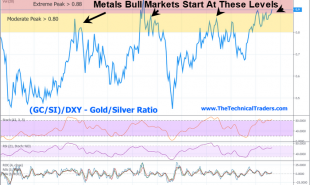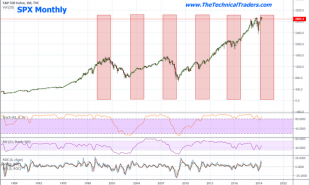
On Tuesday, the SEC approved the first 4x leveraged ETFs.The new ETFs will track 4x or -4x the daily performance of the S&P 500. This could be passive investing's Waterloo
Money Stuff
via Matt Levine
The passive revolution.
What does it mean that the markets are in the middle of a passive investing revolution, in which index funds and exchange-traded funds are seeing huge inflows while active managers are struggling? Perhaps it is a revolution in investor behavior: Perhaps the investing public has read the efficient-markets literature, understood Sharpe's inequality, and decided to just buy and hold broad indexes of stocks. People have given up the dream of outperforming the market, and resigned themselves to the more modest and realistic goal of matching it. But that doesn't sound like how ... people ... work? "You think that everybody suddenly became rational and said, 'I’m not nearly as clever as I thought I was?'" is how one expert put it to my Bloomberg View colleague Joe Nocera.
Another explanation is that it is a revolution in products: People's behavior is more or less the same as it used to be, but the objects of that behavior have shifted a bit. The investor who, 20 years ago, would have just bought and held a big famous stock mutual fund because it seemed solid and reputable and boring, will now buy and hold an S&P 500 index fund for the same reasons. The investor who would have gotten 100 shares of Microsoft Corp. stock as a bat mitzvah present and promptly forgotten them, will now get 100 shares of an ETF and promptly forget them. The investor who bought a bunch of mutual funds and then shifted them every year to chase performance will now buy a bunch of sector ETFs and shift them every year to chase performance. And the investor who constantly day-traded stocks will now constantly day-trade thematic ETFs.
Each investor will have more sophisticated, and lower-cost, tools to achieve the same financial or (more realistically) psychological goals. If you want sensible conservative boredom, you can get it, cheaper. If you want the excitement, and the illusion of mastery, that comes from doing your own trading, then now you can get that in a much more convenient and appealing form. ("I think tech is the future, so I bought a tech sector ETF" is an easier transformation of a hobbyist thesis into a trade than buying individual stocks, and "I think the world is going to collapse, so I bought a levered volatility ETF" is much easier than, like, writing straddles on individual stocks.) Boring investing has become even more boring (you don't even have to pick a star manager), and fun low-information hobbyist investing has become even more fun and lower-information (you don't even have to pick the individual stocks).
The Securities and Exchange Commission on Tuesday approved a request to trade quadruple-leveraged exchange-traded funds, marking a first for the growing market for such products in the United States.
Whee! It's "not going to be for everybody," the funds' distributor said, possibly with a straight face. But for the people who do want roller-coaster-like exposure to the financial markets, this seems a lot easier and more efficient than setting up margin accounts -- or picking stocks -- themselves. Why not find a way to give them their pleasures more cheaply?
This is a less satisfying story than the one about increased rationality driving a move to passive investing. It would be nice if the financial industry made us better and more rational people; if it taught us what we should desire, and then reflected those improved desires. But, you know. That's not how other industries work. The Coca-Cola Co. has not addressed concerns about obesity by returning us to a hunter-gatherer society based on vigorous physical activity and a varied natural diet. It makes Diet Coke. The financial industry responds to our desires, even if they're silly, and gives us more convenient ways to satisfy them.
Is private equity finance?
Yesterday some private equity titans had a panel where they complained that their industry is terrible at public relations, which must have made their PR employees nervous:
"The idea that you can do all that and have great success and be perceived at best in a marginal way in terms of contribution to society, you've got to really wonder who’s doing the PR," Schwarzman said during a panel discussion at the Milken Institute Global Conference at the Beverly Hilton hotel.
And:
"We need some better PR and some help in how we market ourselves," Sokoloff said
I mean, if you run a giant private equity firm, you don't actually have to wonder who's doing the PR. They report to you! You can go to them directly with your concerns, instead of musing darkly about them at a conference. Anyway Stephen Schwarzman and Jonathan Sokoloff's point is that their industry is perceived as a place for strip-em-and-flip-em financial engineering rather than building real operating businesses:
"People mistake us for financial people. I don’t know exactly why," said Schwarzman - worth some $12 billion, according to Forbes - drawing a distinction between private equity investors which own businesses and mere financiers. "If you had 600,000 employees, you might be a company. A responsible company. And that’s what we are."
I feel like I can answer that? I think the reason is that people who work in private equity come, for the most part, from investment banks (Schwarzman from Lehman Brothers, Sokoloff from Drexel), and then they go to work on financial transactions (finding and negotiating and financing corporate acquisitions), and then they get paid a lot of money for doing it. They wear suits and work with Excel in Midtown Manhattan office buildings. It's finance. Of course the people who fix cars at Service King Collision Repair Centers -- a Blackstone Group LP company -- aren't mistaken for financial people. But the millionaires at Blackstone headquarters are thought of as financial people because they are financial people.
Schwarzman's point is not so much that his ex-M&A bankers aren't financial people, as it is that Blackstone isn't a financial company. It's an operating company, a massive industrial conglomerate that, like many conglomerates, employs some highly-paid financial people in corporate development and financing roles at its headquarters, but that makes its money by building and improving operations at companies rather than through purely financial maneuvers. And of course there is truth to that: If you buy a bunch of businesses, you do have to operate them.
But it's hard to think of Blackstone as an old-line industrial conglomerate. Certainly Blackstone's pitch to the financial industry is that it is a financial company. Flocks of 25-year-old Ivy League graduates would not leave their analyst programs at investment banks every year to go work as junior managers at a big industrial conglomerate. In some sense the innovation of the private equity industry was to annex the business of running industrial companies into the financial industry, with its higher cachet and much higher paychecks. Now you can become a billionaire in the global financial industry by being the head of the company that owns Service King Collision Repair Centers. You don't get that kind of money for fixing cars; the money tells you that it's finance.
Elsewhere at the Milken Institute Global Conference, there was a cheetah at a party.
Etsy activism.
A common activist move is to buy a stake in a public company and go public with arguments that the company needs to re-focus its strategy, cut costs, become more efficient, and consider selling itself in order to maximize shareholder value. Black-and-White Capital LP is doing more or less that with Etsy Inc. "black-and-white believes it is the Board’s fiduciary duty to immediately consider all strategic alternatives available, including a possible sale of the entire company," says Black-and-White's press release, and that's all fairly standard except I guess the capitalization.
But Etsy is not quite a standard public company:
Some changes Black-and-White is urging could be at odds with a unique feature of the company: it’s a certified B Corporation. To gain and hold that certification, Etsy adheres to standards, including that it benefit the community, environment, employees, consumers, and suppliers.
For Etsy, that has meant paying workers more than 40 percent above the local living wage and covering most of employees’ health insurance premiums. It also means the company has a mission alongside profit-making.
"There is no justification for these excessive G&A expenses," says one letter from Black-and-White to the board, but there is a justification; it just might not be that the general and administrative expenses add shareholder value. Or Black-and-White complains that Etsy's data-driven development "efforts have been minimized in recent years in favor of a more ideological product strategy." But Etsy is an ideological company! Normally calling a public company's strategy "ideological" is an insult, meaning that its strategy departs from the orthodox ideology of shareholder value maximization. But Etsy admits itself that it departs from that standard ideology, and is proud of it, and says that its reputation could suffer if there were "a perception that we are more focused on financial performance and are no longer as committed to the values shared by Certified B Corporations."
What does that mean for the activist fight? I don't know. Activist fights are often somewhat frustrating because the dialogue goes like this:
Activist: Management is too entrenched, ignores shareholder value, and spends too much money for too little benefit.
Management: Activists are too focused on short-term gains, and their proposals would destroy our long-term plan to create shareholder value.
These arguments are often, in practice, incommensurable: Management claims that it is ignoring shareholders for their own long-term good, the activists claim that it's for self-interested management entrenchment, and the only way to find out is to wait for the long term to arrive. Etsy's B corporation status opens another front in this fight, giving it another set of incommensurable things to argue about. Black-and-White can say that management is too entrenched, ignores shareholder value, and spends too much money for too little benefit. Management can reply that Black-and-White is too focused on short-term gains, would destroy long-term value, and would conflict with Etsy's values.
Incidentally those values are, for Etsy, just a source of arguments: The board can tell shareholders not to support Black-and-White's plans because they conflict with Etsy's values, and because those values are good for Etsy's long-term shareholder value, but ultimately the board is responsible to shareholders like any other public company board. Being a B corporation has no real legal effect and doesn't change the board's fiduciary duties, and Etsy's certificate of incorporation and bylaws are standard public-company stuff. The really interesting fight will come when an activist takes on a "public benefit corporation," a specific legal status meant to let directors consider obligations to the community rather than just obligations to shareholders. (The B corporation rules actually require public B corporations to eventually become benefit corporations, though Etsy seems to have until August 2017 to do it under those rules.) Management-versus-activist arguments are incommensurable enough now, when both sides are supposed to be working on behalf of shareholder value. They'll be really confusing when the board explicitly has other priorities.
People are worried that people aren't worried enough.
Congratulations to this worry, which has made it into the pages of the New York Times:
As political risks have increased at home and abroad, complacency among investors has rarely been so widespread.
This trend, which began soon after President Trump’s victory in November, culminated on Monday, when the VIX index, known widely as Wall Street’s fear gauge, dipped briefly below 10 — the first time it had done so in more than 10 years, in the months before the financial crisis.
A lot of the talk about complacency mentions the rise of volatility as an investable asset class: The fact that you can, say, sell VIX futures changes the dynamic of volatility, as the hedging of volatility trades itself dampens volatility. But you could also consider the rise of volatility as a describable asset class: The fact that there is an index of expected future volatility creates its own commentary, as people use it as a measure of market complacency. It is not good for that purpose: The VIX measures only short-term volatility expectations, and doesn't even predict short-term volatility that well; it mostly just reflects past realized volatility. But it has a snappy name (VIX), and a snappy nickname (the "fear index"), and people can't resist it. If the VIX didn't exist, would people use realized 30-day volatility of the S&P 500 to measure investor complacency? No, of course not, they'd use the level of the S&P 500 to measure complacency: If stock prices are too high, that means investors are complacent. (People do this now, of course, in addition to using the VIX.) But the VIX does exist, and so it has become the story.
People are worried about unicorns.
Hampton Creek Inc., the vegan mayonnaise company that you may remember from last year's story that it was maybe doing some mayo spoofing, is now apparently a unicorn: Its chief executive officer "told Fortune that Hampton Creek raised funds valuing the business at $1.1 billion, without disclosing the amount of capital it received." So, congratulations, it is the Mayo Unicorn (Elasmotherium gloiodes). I guess really the appropriate cryptid is a Mayo Ouroboros.
Anyway, that "without disclosing the amount of capital it received" part is important:
Hampton Creek had set out to raise as much as $150 million, according to an estimate by private stock market firm Equidate based on a corporate filing from August. It has only secured about $7 million toward the funding round, said people with knowledge of the matter.
Selling 0.64 percent of your company for $7 million is a fairly efficient way to become a unicorn, though you could improve on it. Selling 0.001 percent of your company for $10,000, or 0.00001 percent for a hundred bucks, would also technically make you a unicorn. You could imagine some companies trading off unicorn status against, you know, money. Would you rather raise $150 million at, say, an $800 million valuation, or $7 million at a $1.1 billion valuation? It depends on what you are trying to optimize. Being a Mayo Unicorn might create the sort of marketing momentum that would help grow your business. (Much like buying your own mayo from store shelves might do!)
In the olden days, companies did initial public offerings not just to raise money or get liquidity for early investors, but also to raise their public profiles: Being a Nasdaq-listed company bought your dot-com a certain credibility with customers and partners. Now, of course, private markets are the new public markets, and you don't need to go public to raise a lot of money. Or to raise your public profile: Being a unicorn is arguably even better for your reputation than being public. But you do need to be a unicorn. The unicorn round has replaced the IPO as the way for a hot startup to raise its profile.
Elsewhere in food unicorns, the Unicorn Frappuccino has apparently spawned a whole array of mythical horrors. And elsewhere in food horrors: "Apparently, the fast food fans of America can't get enough fried chicken in the shape of other foods."
Blockchain blockchain blockchain.
Egg blockchain!
With participation of several companies we have defined our first blockchain project. We will build and test a system for international payments and deliveries in the egg value chain with the objective to replace the current Letter of Credit system. We are working on a proof of concept to investigate and learn the possibilities and limitations of blockchain technology for the animal protein value chains we are involved in.
When you combine the blockchain with the animal protein value chain, that's when you really drive synergies.
Things happen.
Fed Rate Rise Unlikely Wednesday, but Possible June Move in Focus. EU Brexit Chief Barnier Unveils Detailed Vision of Coming Talks. JPMorgan to Move Hundreds of Staff to Three EU Offices on Brexit. Puerto Rico Faces Hedge Fund Lawsuits as U.S. Reprieve Ends. Here’s What ‘Billions’ Gets Wrong About the Municipal Bond Market. Chinese Conglomerate HNA Becomes Deutsche Bank’s Biggest Shareholder. "An arguable but interesting implication of Newman is that, if a corporation selectively leaks information to favored investors, that information is in the market and, even if not yet reflected in stock prices, should be fair game for other analysts and traders to ferret out." Valeant Ponders a Name Change to Try and Escape Past Reputation. Saudis to Spend Aramco Cash at Home After Reversing Budget Cuts. Facebook’s Female Engineers Claim Gender Bias. The city of Philadelphia just gave Wells Fargo its walking papers. "Inflation is the thing that drives investor aversion to fixed income markets, rather than government borrowing." The Inside Story of How Fyre Festival Went Up in Flames. The Top Celebrity-Finance Crushes on the Met Gala's Red Carpet. The Bugs Of The World Could Squish Us All. If you're looking for fun, you may not find much in Connecticut. Viscount offered £5k for Brexit campaigner Gina Miller to be run over, court hears. Federal prosecutors have charged someone with laughing at Jeff Sessions.
If you'd like to get Money Stuff in handy email form, right in your inbox, please subscribe at this link. Thanks!
Read more by Soren K.Group







